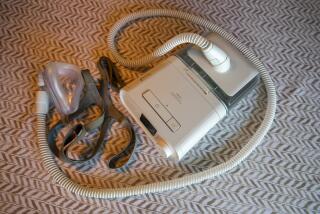Hospital Alerts Patients About Health Danger
- Share via
WASHINGTON — Johns Hopkins Hospital in Baltimore alerted 415 patients Monday that a defective instrument capable of spreading life-threatening lung infections may have been used in a medical procedure they underwent.
In a certified letter, hospital officials said that “although it is impossible to know if you are at risk,” patients who had been examined by bronchoscopes--a thin, tube-like instrument with a tiny camera used to probe the lungs--should call their doctors if they experience fever, coughing, phlegm or shortness of breath.
A spokesman at Johns Hopkins, one of the nation’s leading hospitals, said some patients who underwent the procedure had died, but it was unknown whether their deaths were a result of bacteria introduced by the instruments or their existing illnesses. Most of the 415 patients suffer from cystic fibrosis, AIDS or lung cancer, or recently had lung transplants.
The Baltimore Sun reported Sunday that Hopkins officials discovered the problem after an unusually high number of patients--128, or two or three times higher than normal--had been infected with a bacterium known as Pseudomonas aeruginosa after undergoing the procedure with bronchoscopes manufactured by Olympus America.
Puzzled by the high rates, doctors conducted extensive investigations. They discovered in February that four of the seven Olympus America bronchoscopes in use at Johns Hopkins were defective--a tiny screw-in valve on the instrument was loose--and the hospital stopped using the model in question.
The model was voluntarily recalled by New York-based Olympus America in November, the Sun reported, but Johns Hopkins did not learn of the action immediately because a copy of the recall letter was sent to a wrong department at the hospital. Other companies also manufacture bronchoscopes and patients who have been examined by them should not consider themselves at risk, doctors said.
Because of Johns Hopkins’ experience, other hospitals in the country were checking their medical records to see if they had a similar problem. The Food and Drug Administration and the Centers for Disease Control and Prevention are investigating the problem.
Pseudomonas infections are relatively common in patients with damaged immune systems. The bronchoscope procedure is also common, performed about 460,000 times a year in the United States. But instruments that are not properly disinfected can cause infection, which was the subject of an FDA health advisory in 1999.
For Johns Hopkins University, the nation’s largest recipient of federal medical research funds, the bronchoscope problem is the latest in a string of embarrassments.
In November, the university barred a doctor from leading research involving human subjects after he tested experimental cancer drugs on patients in India without approval of a university review board. There was no evidence patients were harmed.
And in July, the U.S. government temporarily halted all federally funded research on humans for five days after the death of a volunteer in an asthma experiment. The university had about 2,400 experiments underway at the time.
More to Read
Sign up for Essential California
The most important California stories and recommendations in your inbox every morning.
You may occasionally receive promotional content from the Los Angeles Times.













